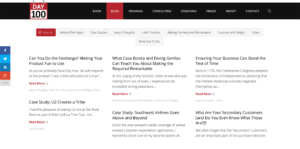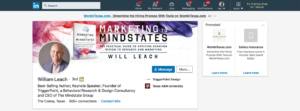If you want to reach a lot of people with your Author blog, here’s one of the most important things I’ve learned as a 4X New York Times bestselling author:
It might sound counter-intuitive, but the best way to go big is to think small.
It’s as true for your blog as it is for your book: target a laser-focused audience with a specific problem you can solve.
I say this a lot because it works. As Dan Sullivan says, “The smaller the niche, the larger the market.” Know who you’re trying to reach and how you can help them.
If you know those two things, you’re light-years ahead of most of your competition.
For most nonfiction Authors, the point of a book is not to sell books. It’s to sell you. A well-published book leads to speaking engagements and new clients. That’s how it makes money.
Your blog should do the same thing. Focus on your ideal clients and how you can help them solve a specific problem—the same clients and problem you’re targeting with your book.
With that targeted focus, your author blog can be a consistent platform for success—not just for your book, but for you as an Author.
How Blogging Promotes Your Author Brand
As great as all that sounds, let me be perfectly clear:
You don’t need a blog.
You don’t need it to write a book or to run a stellar book marketing campaign.
So if you’re not sure you want to start one, don’t.
That said, done right, a blog can help you. A blog can take a lot of different forms, and there might be one that appeals to you more than others.
The only thing a blog is good for is producing content that helps people. There are many ways to do that.
You could answer one quick question every week. You could write longer content every quarter. You could even publish a series of podcasts or videos, writing scripts ahead of time or answering questions on the fly.
The point is to share your knowledge in a way that helps the types of people you want to serve—if you do that, it will help them and you.
However you decide to do it, a blog can raise your visibility and expand your Author presence by:
- driving new leads to your Author website
- showing potential clients how much you know
- increasing the number of other sites that link to yours
- helping your SEO for Google and other search engines
- linking to a mailing list to gather new subscribers
Most of all, a blog is a way to expand your Author platform, engage with your contacts on a regular basis, and keep yourself in front of your audience.
Send that new content to your mailing list, publish it on LinkedIn, tweet it, post it, or include it on any other social media where you have a strong presence.
Don’t build any of those just for your blog. But if you have them, use them.
Link your blog’s RSS feed to your Amazon Author Page and your Goodreads Author Page to expand your reach without any extra work.
Our Favorite Author Blog Examples & Inspirations
1. Joey Coleman

Joey Coleman’s blog is a fantastic example of on-brand blogging that looks great and draws readers in, providing a ton of value without a huge time commitment.
Things we love about the blog:
- The clean design matches the style and colors of his book cover
- All the post titles are catchy, promising entertainment as well as information
- Each post includes a relevant embedded video (that he didn’t have to produce)
- His contact info is in the footer, so visitors can reach out from any post
- The footer also includes an outstanding Author photo, perfect for his brand
Finally, the blog offers a variety of content while focusing specifically on one question: how to hold onto customers. I can’t stress enough how awesome that is.
Joey’s book, Never Lose a Customer Again, is about exactly that. Every single post on his blog is about that same thing, but each one comes at his message from a different angle.
U2, Heineken, Southwest Airlines, Cirque du Soleil. With enough brand variety in the post titles to pique anyone’s curiosity, the blog offers a broad appeal to a targeted audience.
2. Michel Falcon

Michel Falcon’s blog is a series of videos. Some are micro-courses on specific topics. Others are podcast-style interviews in which he solves problems for real entrepreneurs and executives without a script.
Things we love about the blog:
- Unscripted dialog showcases Michel’s tremendous knowledge and skill
- Guest interviews draw in new visitors from other Author sites
- Blog topics offer helpful solutions to common business problems
- “How to” titles draw readers in for the answers they need
One of the best things about Michel’s blog is his choice of a video medium, which suits his Author brand perfectly.
The collection of interviews and short content in a speaking-engagement style really show off what he can do, giving potential readers and clients a video resume that works for him 24/7.
His book, People-First Culture, is another marketing tool that works for him 24/7, no matter where he is in the world. When you pair your book with the right promotional tools, great things happen.
3. Will Leach

Will Leach’s blog is a series of posts about mindstates, tying directly into his book, Marketing to Mindstates. It offers a terrific blend of popular culture and business solutions, proving Will’s mastery of his craft.
Things we love about the blog:
- References to shows like “Game of Thrones” and “The Bachelorette” draw readers in
- Long-form content digs deep and offers specific advice
- Parallels between TV characters and real-life behavior make for memorable lessons
- Using LinkedIn serves up his content to active, engaged connections
This glimpse into the world of subconscious marketing is both fascinating and varied. From winning “The Bachelorette” to digital detoxing, Will offers multiple insights into his singular focus: the power of the mindstate perspective.
4. Bryan Miles

Bryan Miles wrote the book on Virtual Culture. Literally. His manifesto on the benefits of remote work has been wildly successful, bringing in millions for his company.
Things we love about the blog:
- The green highlighting throughout the design matches his book cover
- A featured post drives potential readers to spotlighted content
- Using images of people on each post shows the human connections of the virtual world
- Day-in-the-life posts connect to new contacts while engaging readers
- How-to advice offerings are always popular posts
Like most Authors, Bryan isn’t a full-time writer. He’s a professional with an important message. By staying focused on that message, he’s engaging his audience and building a virtual empire.
5. Janet Newman

Janet Newman’s blog provides a mix of written, podcast, and video content, all related to her book, Living in the Chemical Age. Interviews connect the website to other health experts, expanding Janet’s reach while providing helpful content for her own readers.
Things we love about the blog:
- The clean, open design is perfect for her message of health and clean living
- The mix of written, audio, and video content offers multiple ways to access her message
- Titles like “12 Hidden Toxins You May Not Know Are in Your Kitchen” make the content personal
- Search engines love those list posts almost as much as readers do
Janet’s blog highlights some of the best writing advice I can offer for any Author blog: stick to your message. Janet wrote her book to help people live healthier lives in a chemical world. Her blog does the same thing.
It provides helpful content and advice, from building your “toxic awareness” to small lifestyle substitutions that can make a big impact on your health.
Readers who are interested in these topics will be drawn to her book, and people who have read the book will find new information and more ways to engage with Janet’s message.
How to Get Started with Your Own Author Blog
The excellent writers’ blogs highlighted here were not created by full-time Authors. They were created by professionals with other jobs, just like you.

That’s what nonfiction books do for new Authors—put them, and their message, into the spotlight. If you’re interested in starting a blog of your own, it’s a great way to showcase your message and reach a new audience.
If you already have an Author website, you should be able to integrate a blog into it without much effort. Most web-host platforms provide an easy way to do that.
If you haven’t built your site yet, consider a platform like WordPress. Built for writing blogs, it provides blog-friendly plugins like guest accounts, making it easy to invite co-bloggers or host guest posts of your own.
For more information on starting your own blog as a published Author, read my full post on creating great Author websites.


